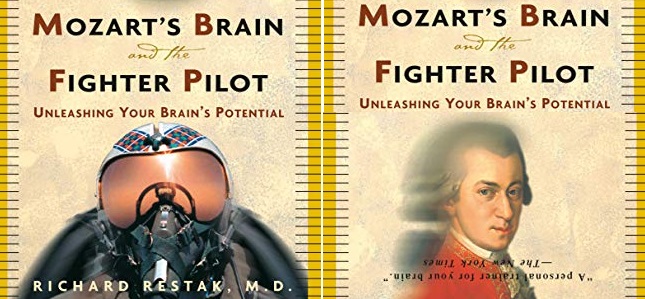Mozart’s Brain and the Fighter Pilot
I’ve been dipping into this weirdly named book for the last 20 years – finding each suggestion valuable.
It’s written by Richard Restak, who is both a psychiatrist and a brain scientist. He’s been writing for both academics and a wider audience since 1977. His essential argument is that we should all learn as much as possible about how the brain works, and then use this knowledge to increase our capabilities. And Restak then becomes our guide to both.
The book contains 28 relatively brief and readable chapters with exhortations like “think of the brain as the creator or incredibly rich and fascinating montages”, “improve your memory by using a memory system”, “develop your emotional memory”, “engage in activities that stimulate extensive portions of the brain”, “develop your powers of thinking about thinking”, “cultivate fine-motor-skills involving your hands”. Each chapter gives a picture of how the brain works for that idea, and ends with suggestions and exercises to get there.
There are many chapters that have had a great influence on me – although now looking at the table of contents – there are also many I’ve ignored and need to get back to! But the one that always comes to mind is “use technology to augment your brain’s functioning”. I took this to heart around 11 years ago, and started making electronic notes of many aspects of my life: my shopping habits, my holiday ideas, collecting important things I’ve read (like a massive internet favourites list), writing about the key things that had happened each workday or in my personal relationships, my hopes and plans, and how I might say things in an upcoming difficult situation.
Many people know the benefits of writing a journal: it forces you to state what you’ve heard other people say, and what you feel about things. And doing this pulls things out of one part of your memory and turns it into language, so creating more neural networks in a different part of your brain. And these too are then available for later use. By saving this writing electronically we have a better chance of finding them again – using tags which collect topics together, and using search. Something I’ve found to be very powerful is wherever possible to record the names of people who’ve contributed to the idea (whether an author, friend or colleague). This works for me, because I can nearly always remember the name of the person, even if I can’t remember the full detail of the idea, again increasing the chances of finding it again.
I’ll finish by telling you how my 13 year old grandson used it. I read out several chapter headings and asked him to chose one. He went for “strengthen your powers of attention and concentration”. We read the chapter together, and for the next few days he spent a great deal of time finding and doing the online lessons advised. I’m sure this helped his powers.
Buy the book! You can get a second hand copy here for around £3! You can’t lose!
